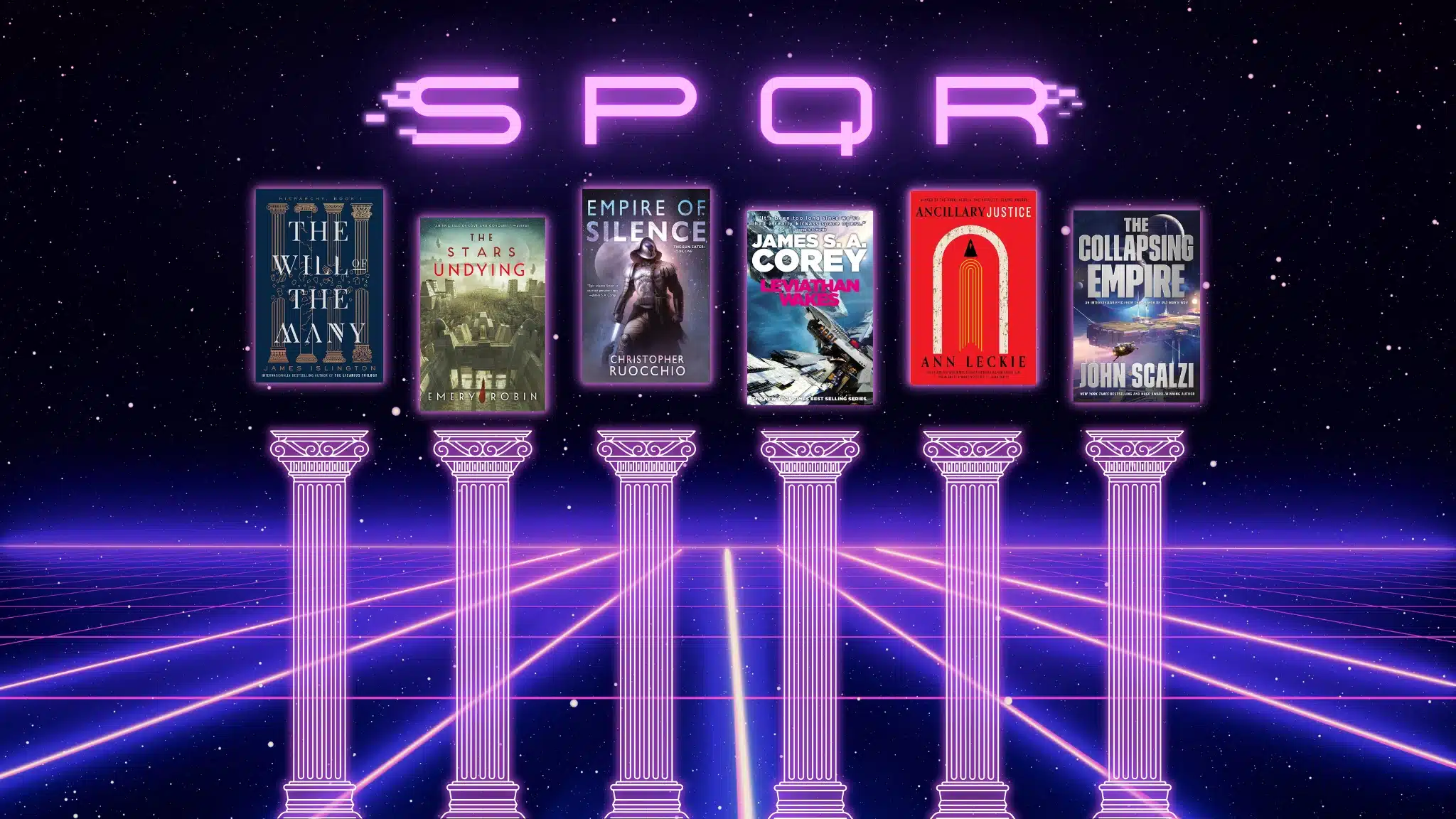Rome; its reputation precedes itself as perhaps the most well-known ancient civilization. From its rich culture to its political system, its presence can be felt in our modern day — and thanks to its legacy as a powerful imperial force, it’s also dominated the world of historical fiction and even served as the inspiration for many a fantasy series.
But what about Rome … in space?
It may sound ridiculous, if you’re picturing toga-clad legionaries floating around in zero gravity. But the truth of the matter is that many a science fiction writer has been influenced by Ancient Rome’s military and political strength. The structure of Imperial Rome and its eventual fall even served as inspiration for George Lucas when developing Star Wars. Really, it’s fitting that Ancient Rome has served as the bedrock of so many sci-fi stories of empires — their conquering prowess, their expansive authority and their eventual fall.
These six science fiction novels use the essence of Ancient Rome to its fullest effect, creating immersive worlds of sprawling imperial power that rule with an iron fist over their subjects. Each story takes an unflinching look at what it means to live in an empire that stretches not just over land, but the full expanse of the stars.
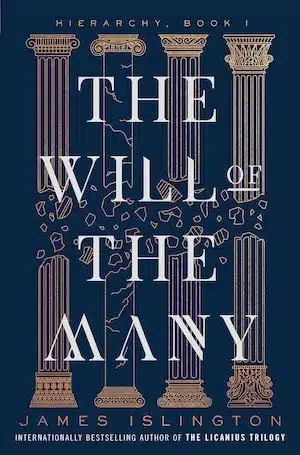
The Will of the Many by James Islington
One needs only to look at the cover of James Islington’s breakout hit to see the Roman influences. The world of the Catenan Republic is full of fragments of the ancient civilization, most notably in the strict class structure that gives the Republic its other name — the Hierarchy. Catenan sorts its population into eight ranks, with Octavus at the bottom and Princeps at the very top. This is not merely for organization, however, but a brutally effective usurpation of power. An Octavus must cede their Will — their life force and strength — to a Septimus, then a Septimus to a Sextus, so on and so forth up the ladder, strengthening the ruling class at the expense of the entire populace.
Ceding one’s Will at some point or another is nearly impossible to avoid, but protagonist Vis Telimus will do whatever it takes. The orphaned prince of a lost kingdom, he’s determined to avenge his family and strike back against the conquering Catenan Republic. He comes upon the unusual opportunity to attend Catenan’s most prestigious Academy, brushing shoulders with the children of the Republic’s most powerful politicians. But there, Vis soon learns that his past struggles for survival are nothing compared to what’s to come. There’s something dark going on at the Academy — something that makes the cutthroat competition between its students look like child’s play.
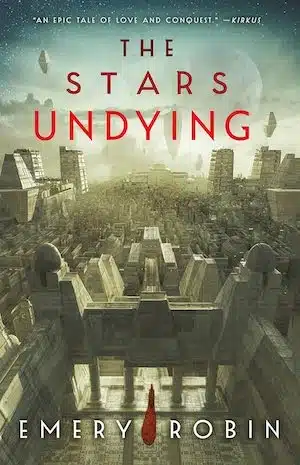
The Stars Undying by Emery Robin
The name Julius Caesar is pretty much synonymous with Rome — and the same could be said for his famous lover, Cleopatra, and her Egyptian Empire. In The Stars Undying, author Emery Robin takes inspiration from the historical couple’s star-crossed love story and transforms it into a sweeping queer space opera spanning everything from colonization to a planetary god housed in computer programming.
Princess Altagracia of Szayet has been betrayed by her twin sister, robbed of both her throne and the planet’s Pearl — Szayet’s aforementioned patron god. Starved for allies, she seizes the opportunity when the conquering interstellar Empire of Ceiao sets their sights on Szayet. But Ceiao’s infamous commander, Matheus Ceirran, will not be easy to trick — nor, as it turns out, will his enigmatic captain Anita. And as Gracia sinks deeper into the empire’s hold, she must navigate a world far more complicated than she first imagined — not just the backstabbing politics of Ceiao, but the complex dynamics between her desires and those of Matheus and Anita’s.
Praised by authors from Everina Maxwell to Casey McQuiston, The Stars Undying pushes the boundaries of past and future, creating a blend of historical romance and epic science fiction on a galactic scale.
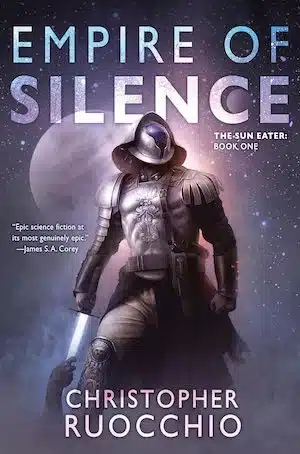
Empire of Silence by Christopher Ruocchio
What’s more quintessentially Roman than a gladiator fight? As it turns out, a gladiator named Hadrian.
But Hadrian Marlowe, the hero of Empire of Silence, doesn’t start out as a gladiator. He doesn’t start out as any of the things the galaxy will one day know him as — the monster, the soldier, the Sun Eater. He begins his epic tale as a runaway, turning his back on his father and a future of torturing others, only to end up in the hostile court of a foreign planet. There, Hadrian is thrown into the ring and forced to fight for his life — first as a gladiator, then as a soldier. The army is locked into a bitter war with an alien enemy Hadrian can’t even begin to understand — an entity he has no quarrel with, but will rip him apart nonetheless.
The first entry in the lauded Sun Eater series, Empire of Silence stuns as the foundation for a story that transcends time and space, stretching across centuries to capture the death throes of an empire in crisis. James S.A. Corey, the New York Times-bestselling author of The Expanse Novels (a name that will feature later in this article), calls it “epic science fiction at its most genuinely epic.”

Leviathan Wakes by James S.A. Corey
The first in the Expanse Novels, Leviathan Wakes introduces us to Jim Holden, an ice miner on his way back from a job within the rings of Saturn. He and his crew soon stumble upon an abandoned ship, the Scopuli — a ship that, unbeknownst to them, houses a horrifying secret. Meanwhile, Detective Miller has been sent to that very ship in the search for a parent’s missing child — and as his and Jim’s paths cross, the mystery of what this child could represent deepens. Because while Jim and his crew may have come upon this information accidentally, that doesn’t matter to those who want to keep things quiet — by any means necessary.
Classics nerds may recognize the word Scopuli from Virgil’s Aeneid, where the Sirenum Scopuli are named as the rocky island dwelling of the legendary sirens. More references to ancient civilizations accumulate the further readers delve into the Expanse Novels, particularly in the introduction to the Laconian Empire, hailed as the center for civilization — and a mysterious entity within the books explicitly referred to as “the romans.” Spanning nine full novels and eight novellas, this series is undoubtedly an undertaking to read. But, in the words of George R. R. Martin, it’s also “interplanetary adventure the way it ought to be written.”
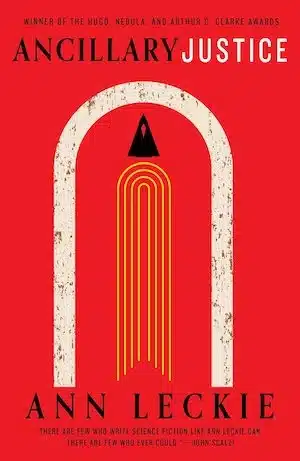
Ancillary Justice by Ann Leckie
Breq is a protagonist unlike any other on this list. She’s not a gladiator, nor a conniving princess. She is — or at least, she was — a ship. Once, she was known as the Justice of Toren, an artificial intelligence-powered starship in service to the conquering Radch Empire. But now, Breq is now being punished by occupying a fragile human body on an icy, inhospitable planet. But Breq is determined to find justice for herself, and she won’t let anything — not the limits of her new body, not the threat of mortality, not even the universe itself — stand in her way.
With writing compared to that of Ursula K. Le Guin, author Ann Leckie weaves threads of power, identity and gender throughout the novel, asking us to question what an empire does with citizens it no longer finds useful for its ever-grinding war machine. Like the other authors on this list, Leckie also draws inspiration from the Romans when it comes to the conquering power of her novels, the Radchaai — an entity that looms large, stretching across the galaxy with such vastness that surely, Breq cannot even begin to challenge. But Breq has a few tricks up her sleeve, and readers will have to dive deep into the text to pull at the threads and discover the truth about this wholly unique protagonist — an incredibly unlikely, unforgettable hero.
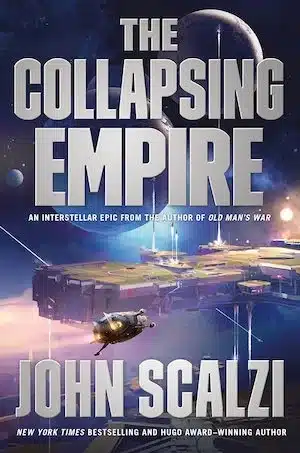
The Collapsing Empire by John Scalzi
In a universe ruled by physics, there are some rules you simply cannot break — one being that it is impossible to travel faster than light. It’s impossible, at least, up until the discovery of the Flow: an extradimensional field that can travel around stars and past the limits of the known universe. And like the Roman Empire’s roots on the banks of the river Tiber, so a new empire builds itself upon the openings to the Flow. This one is known as the Interdependency, and its tenets stress that no human settlement can survive without connection to others. It’s a clever bit of doctrine that works to keep its empire united as a single force — and one massive territory easy to exert control over.
This doctrine becomes a problem, however, when it’s discovered that the entire Flow is moving — not just flowing, but changing course, cutting off entire planets in the process. By the time it’s discovered that the lifeblood of the Interdependency is causing its own demise, it’s already too late; now three main characters must scramble to save who and what they can in the collapse. With its sprawling scale and grandeur, it’s no wonder that The Collapsing Empire won the 2018 Locus Award for Best Science Fiction Novel and was a finalist for the Hugo Award for Best Novel that same year. The novel asks us to consider the true horror of an empire in decline — what the slow inevitability means for every citizen, from a starship captain to even the emperox of the empire itself.
